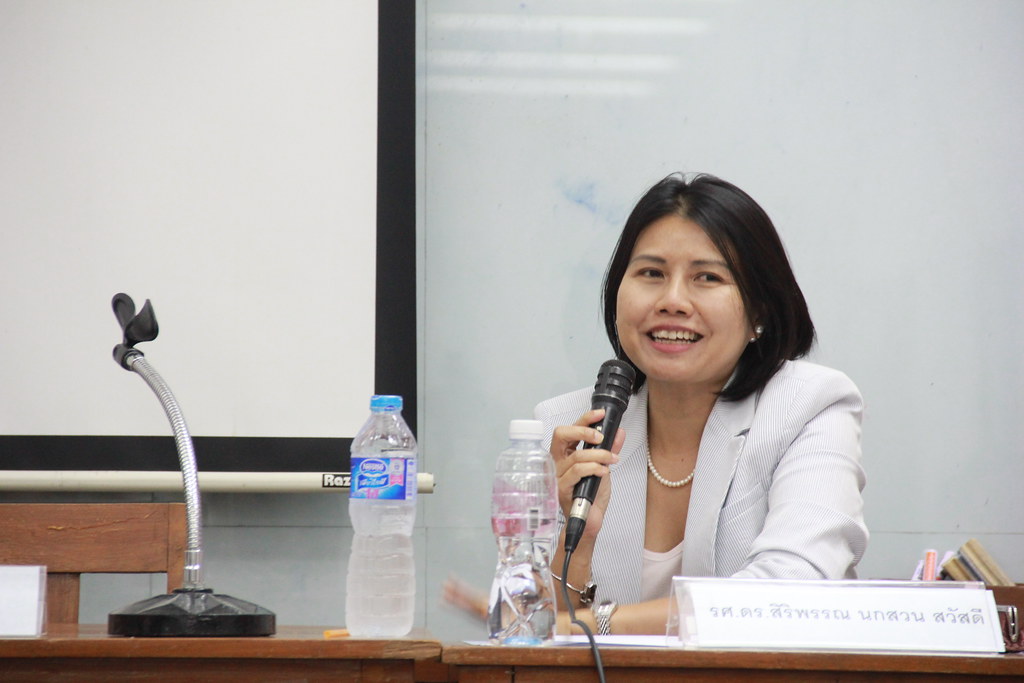Under the principals of a parliamentary democracy, an “outsider” Prime Minister is a Prime Minister who is not a Member of Parliament.
In principal, a Prime Minister should be elected, since the “election of representatives” is the starting point of the contract between those who hold power and those to whom they delegate that power. Thus, the process of recruitment and selection of persons who will hold political positions is a measure that controls the relation between the people and their representatives, both ex ante and ex post, through an institutional monitoring mechanism, as well as public monitoring channels to make sure that the representatives show themselves accountable to the public who elected them.

Siripan Nogsuan Sawasdee
It is therefore important to have an election process which allows the public to express their true needs, in order to build a relation between the people and their potential representatives and to prevent any hidden action by those who are delegated with authority which deviates from the intention of the people who hold democratic power.
The problem of the election system under the 2017 Constitution is that, even though the list of prime ministerial candidates will be made public in advance, implying that this Prime Minister will have been approved by the people, the chain of this approval is not straightforward.
The connection between voters and a potential Prime Minister is weakened in three ways.
1. How are we to be sure that a cross on the ballot paper is approval of a prime ministerial candidate? It could in fact mean that voters are only choosing the candidate in their constituency whose work in the area has won popular support, but they do not like the party or the proposed prime ministerial candidates.
2. In the case that voters make their decision because they want to support a potential prime minister, how are they to know for which proposed candidate, out of the three that a party can propose, their vote will support? For example, during their campaign, Party A may propose Mr Smith as a prime ministerial candidate, but after the election, the party may propose the name of Ms Jones to parliament as their first-choice candidate.
3. When combined with the requirement that the 250 senators appointed by the NCPO (in the first five years) will also be voting for the Prime Minister from the names proposed by parties, the link between the people and the Prime Minister becomes even more remote.
If the 250 senators all vote for a candidate proposed by a political party, that candidate will need only 126 more votes from the lower house, whose members are elected. This is equal to about 9.5 million votes out of 50 million eligible voters.
For these reasons, I believe that even though the constitution dictates that a party can propose three candidates, and the list of potential prime ministers will be made public, this will not legitimize the person selected as Prime Minister unless that person has been elected as a member of parliament by constituency or party list.
Do not fall into a trap when they tell you that the names of the prime ministerial candidates will be made known to the public.
Allow me to end with a little bit of history: the 1974 Constitution was the first time a Prime Minister had to be a member of parliament. This requirement remained when the 1991 Constitution was amended on 12 September 1992. And this was the case for the 2007 constitution, until it was repealed on 22 May 2014. The 2017 Constitution no longer requires the Prime Minister to be selected from among members of parliament.
Translated from “นายกรัฐมนตรีคนนอก” คือ นายกรัฐมนตรีที่ไม่ได้มาจากการเลือกตั้งของประชาชน. First published on Prachatai, 12 December 2018

Since 2007, Prachatai English has been covering underreported issues in Thailand, especially about democratization and human rights, despite the risk and pressure from the law and the authorities. However, with only 2 full-time reporters and increasing annual operating costs, keeping our work going is a challenge. Your support will ensure we stay a professional media source and be able to expand our team to meet the challenges and deliver timely and in-depth reporting.
• Simple steps to support Prachatai English
1. Bank transfer to account “โครงการหนังสือพิมพ์อินเทอร์เน็ต ประชาไท” or “Prachatai Online Newspaper” 091-0-21689-4, Krungthai Bank
2. Or, Transfer money via Paypal, to e-mail address: [email protected], please leave a comment on the transaction as “For Prachatai English”
